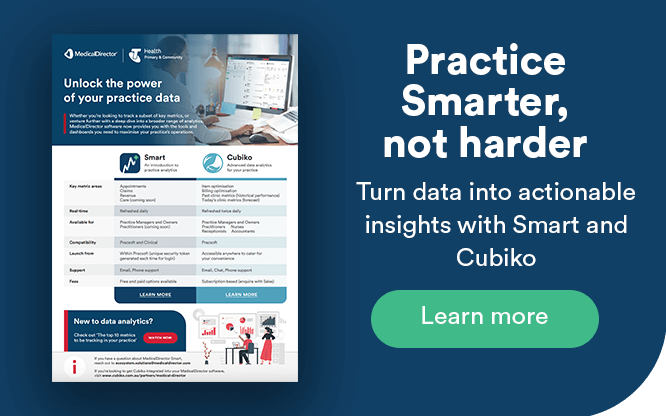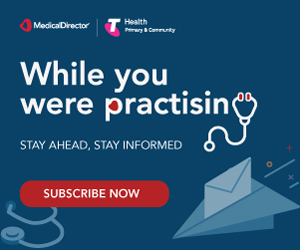Effective communication with patients
Patient communication is a skill to be learned in medical school and developed throughout a clinician’s career.
The cost of not communicating effectively could result in poorer patient outcomes, with studies showing the majority of patients don’t even get to disclose significant concerns due to interruptions by clinicians.
Missed opportunities to provide patient education, cultural differences, patient anxiety, misperceptions about the amount of information patients want and the use of medical jargon can all contribute to poor patient understanding.
In this blog we look at how healthcare professional communication skills can improve patient care and how the entire general practice team can benefit from the latest technology to support more effective patient communication and patient education.

Communication skills throughout the healthcare setting
In healthcare settings, the entire medical practice team has a part to play in good communication with patients.
With so many interactions from bookings, rescheduling appointments to providing referrals, prescriptions and other medical documents, the opportunities to do it well are endless.
Using technology to streamline and make communication more efficient has benefits for both the patient and medical practice.
Introducing the MyPractice app
MedicalDirector’s practice management software has integrated with Medinet’s MyPractice app to enable secure and streamlined communication between GPs and their patients.
Doctors using MedicalDirector Clinical can now easily select the medical certificates, referrals, results and prescriptions they want to share with their patient during a consultation from within the sidebar.
Some practices have successfully gone paperless, thanks to the ease of uploading and securely storing patient medical documents with the MyPractice app.
This unique integration with MedicalDirector has also meant that documents shared to the MyPractice app are sent directly from the practice and not stored on a third party server, ensuring sensitive patient information is kept secure.
With all medical documents stored in one place, the risk of important communication becoming misplaced is reduced and the patient can better manage their own health when they see other healthcare providers.
Medical practices can also communicate news and health reminders to patients via the app, providing patient education and keeping their patients engaged.
For patients with family members helping manage their care, the app can enable this to occur more easily with the patient’s consent.
Other benefits:
- Patients can conveniently book telehealth appointments within the app, saving time and the hassle of logging into another third party booking application.
- The app even enables patients the option to arrange to collect medications from a local pharmacy or arrange for them to be delivered to their door.
- Documents sent in the app are transmitted securely and encrypted, ensuring a high level of protection for individual patient data.
The MyPractice app connects to the patient through their unique mobile number and date of birth.

Communication skills – refresher for clinicians
Effective patient/clinician communication is the cornerstone of good healthcare. Active listening and empathy and the use of open ended questions to gather information, followed by frequent summaries to clarify what the patient is saying and their understanding, can improve the quality of care provided.
The Australian Medical Council Code of Conduct outlines nine components of effective doctor patient communication.
- Listening to patients, asking for and respecting their views about their health, and responding to their concerns and preferences.
- Encouraging patients to tell you about their condition and how they are currently managing it, including any alternative or complementary therapies they are using.
- Informing patients of the nature of, and need for, all aspects of their clinical management, including examination and investigations, and giving them adequate opportunity to question or refuse intervention and treatment.
- Discussing with patients their condition and the available management options, including their potential benefit and harm.
- Endeavouring to confirm that your patient understands what you have said.
- Ensuring that patients are informed of the material risks associated with any part of the proposed management plan.
- Responding to patients’ questions and keeping them informed about their clinical progress.
- Making sure, wherever practical, that arrangements are made to meet patients’ specific language, cultural and communication needs, and being aware of how these needs affect understanding.
- Familiarising yourself with, and using whenever necessary, qualified language interpreters or cultural interpreters to help you to meet patients’ communication needs.
Communicating effectively with patients – refresher for general practice staff
Key attributes of general practice staff are strong interpersonal and communication skills to communicate effectively with healthcare professionals and patients.
Being non-judgemental, open-minded and able to work in an unpredictable environment are also invaluable.
Underlying attitudes, assumptions, previous patient experience, personality, language barriers, disability, health literacy and emotions can impact staff/patient interaction.
Be mindful of language
The words we use, in written and verbal communication, can have a positive or negative impact on patient centred care.
Inclusive langauge recognises, respects and acknowledges diversity in age, cultural background, religion, disability, gender, sexual orientation, bodies and gender identity.
Inclusive language refresher:
- Avoid gender and cultural stereotyping.
- Use language that acknowledges not everybody is hetrosexual such as partner or parents.
- If you’re unsure about a person’s pronouns, use their name or ask them what they prefer.
- Use correct terminology such as First Nations, First Australians or Aboriginal and or Torres Strait Islander peoples (note plural).
- Be mindful of outdated terms such as handicapped and use “person with a disability” instead.
- Use respectful language that promotes dignity rather than using labels such as ‘difficult’ which can be de-humanising.

Integrating with MyPractice
The MyPractice app integration is available in MedicalDirector’s Clinical software.
Already with MedicalDirector and want to integrate with the MyPractice app? Visit our webpage to find out how.
New to MedicalDirector? Contact us today to find out more about our clinical and practice management software medicaldirector.com/contact.
About MyPractice
The MyPractice app by Medinet has already been downloaded by over 250,000 Australian patients, helping them to connect with their health care providers and empowering them to manage their health. mypracticeapp.com.au/










